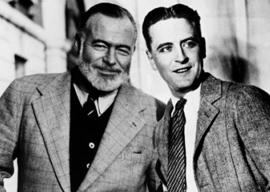
April 13, 2012

Ernest Hemingway and F. Scott Fitzgerald
Fitzgerald had a dream start. His few great life experiences took place in the realm of love and imagination—he wrote three best-sellers and won the girl. But he also lost the girl due to her infidelity. More tragically, he lost the golden girl of his imagination. These personal losses provided some aspect of the emotional maturity and depth of understanding which shaped his two best works, The Great Gatsby and Tender Is the Night. Yet his books were not confessional; they were works of art. To me, he was the supreme artist.
In August 1936 Papa’s “The Snows of Kilimanjaro” appeared in Esquire magazine, which included a Fitzgerald story in the same issue. Scott read the story while recovering from a broken shoulder.
The rich were dull and they drank too much, or they played too much backgammon. They were dull and they were repetitious. He remembered poor Julian and his romantic awe of them and how he had started a story once that began, “The very rich are different from you and me.”
It was obvious that “poor Julian” was poor Scott. When Scott read that he was deeply hurt. He wrote Papa telling him to lay off, and Hemingway wrote back that he hadn’t written anything different than what Scott had written about himself in the same issue.
On a recent television program about books, Ben Macintyre listed Gatsby as his all-time favorite. It’s certainly on my Top Three list, and to hear it from a Brit made me happy as hell. What made me less happy was to read a letter from an American professor of literature calling Jay Gatsby/James Gatz an American tragedy. The idiot prof says that Gatsby dreams to possess a wealthy brat whose value he converts into money and calls it love. Gatsby will do anything to amass wealth to buy her. And he does—briefly. The moron professor thinks that good old Jay is the wrong role model for Americans.
Like most professors, this buffoon did not get the point, even though he taught Gatsby for 30 years. The point is that we can never really be someone else. We are who we are, and I’ve known a few would-be Gatsbys in my life and could see right through them. That’s why Jay was different. He could have fooled even me, an old-timer who regrets only two things: Not having met and run with Hemingway and Fitzgerald.